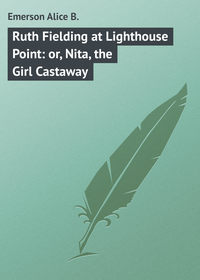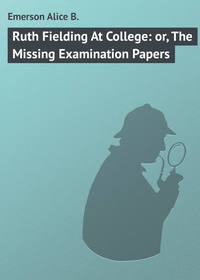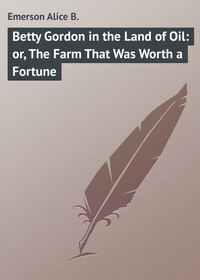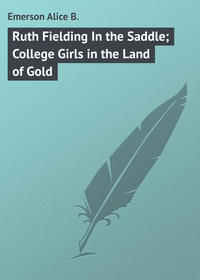 полная версия
полная версияRuth Fielding Down in Dixie; Great Times in the Land of Cotton
Helen moved in the berth above. “Hullo, up there!” whispered Ruth.
“Hullo, down there!” was the quick reply. “What ever made me wake up so early?”
“Because you want to get up early,” replied Ruth, this time sliding out of her berth so adroitly that she did not bump her head.
Helen came tumbling down, skinning her elbow and landing with a thump on the floor. “Gracious to goodness – and all hands around!” she ejaculated. “Talk about sleeping on a shelf in a Pullman car! Why, that’s ‘Home Sweet Home’ to this. I came near to breaking my neck.”
“Come on! scramble into your clothes,” said Ruth, already at the wash basin.
Helen peered out. “Why – oh, my!” she said, shivering and holding the lacy neck of her gown about her. “It’s da-ark yet. It must be midnight.”
“It is ten minutes to four o’clock,” said Ruth promptly. She had studied the route and knew it exactly. “That is Chincoteague Island Light yonder. That’s where those cunning little ponies that Madge Steele’s father had at Sunrise Farm came from.”
“Wha-at?” yawned Helen. “Did they come from the light?”
“No, goosy! from the island. They are bred there.”
Ten minutes later the chums were out on the open deck. They raced forward to see if they could see the sun. His face was still below the sea, but a flush along the edge of the horizon announced his coming.
“Oh, see yonder!” cried Helen. “See the shore! How near! And the long line of beaches. What’s that white line outside the yellow sand?”
“The surf,” Ruth said. “And that must be Hog Island Light. How faint it is. The sun is putting it out.”
“It’s a long way ahead.”
“Yes. We won’t pass that till almost six o’clock. Oh, Helen! there comes the sun.”
“What’s that?” asked Helen, suddenly seizing her chum’s wrist. “Did you hear it?”
“That splash? The men are washing decks.”
“It is a man overboard!” murmured Helen.
“More likely a big fish jumping,” said the practical Ruth.
The girls hung over the rail, looking shoreward, and tried in the uncertain light to see if there was any object floating on the water. If Helen expected to see a black spot like the head of a swimmer, she was disappointed.
But she did see – and so did Ruth – a lazy fishing smack drifting by on the tide. They could almost have thrown a stone aboard of her.
There seemed to be a little excitement aboard the smack. Men ran to and fro and leaned over the rail. Then the girls thought they saw the smackmen spear something, or possibly somebody, with a boathook and haul their prize aboard.
“I believe somebody did fall overboard from this steamer, and those fishermen have picked him up,” Helen declared.
The girls watched the sunrise and the shore line for another hour or more and then went in to breakfast. When they came back to the open deck the steamer was flying past the coast of the lower Peninsula, and Cape Charles Lightship courtesied to her on the swells.
Far, far in the distance they saw the staff of the Cape Henry Light. The steamer soon turned her prow to pass between these two points of land, known to seamen as the Capes of Virginia, which mark the entrance to Chesapeake Bay.
Their fair trip down the coast from New York was almost ended and the chums began to pick up their things in the stateroom and repack their bags.
CHAPTER V – THE NEWSPAPER ACCOUNT
“Do you suppose Nettie and her aunt have arrived, Ruth?”
“I really don’t,” Ruth Fielding said, as she and her chum stood on the upper deck again and watched the shore which they were approaching so rapidly.
“Goodness! won’t you feel funny going up to that big, sprawling hotel alone?”
“No, dear. I sha’n’t be alone,” laughed Ruth. “You will be with me, won’t you?”
Helen merely pinched her for answer.
“The rooms are engaged for us, you know,” Ruth assured her chum. “Mrs. Parsons knew she might be delayed by business in Washington and that we would possibly reach the hotel first. They have our names and all we have to do is to present her card.”
“Fine! I leave it all to you,” agreed Helen.
“Of course you will. You always do,” said Ruth drily. “You certainly are one of the fortunate ones in this world, Helen, dear.”
“How am I?”
“Because,” Ruth said, laughing, “all you ever will do in any emergency will be to roll those pretty eyes of yours and look helpless, and somebody will come to your rescue.”
“Lucky me, then!” sighed her friend. “How green the grass is on the shore, Ruth – and how blue the water. Isn’t this one lovely morning?”
“And a beautiful place we are going to. That’s the fort yonder – the largest in the United States, I shouldn’t wonder.”
As the steamer drew in closer to the dock those passengers who were not going on to Norfolk got their hand baggage together and pressed toward the forward lower deck, from which they would land at the Point. The girls followed suit; but as they came out of their stateroom there was the omnipresent colored man, in his porter’s uniform now, ready to take the bags.
Ruth and Helen let him take the bags, though they were very well able to carry them, for he was insistent. The stewardess – a comfortable looking old “aunty” in starched cap and apron – was likewise bobbing courtesies to them as they went through the saloon. Helen’s ready purse drew the colored population of that boat as a honey-pot does bees.
As they descended to the lower deck, suddenly the queer looking school teacher, with the short hair and funny clothes, faced them. The purser had evidently been trying to pacify her, but now he gave it up.
“You mean to tell me that you won’t demand to have these girls examined —searched?” cried the angry woman. “They may have taken my ticket for fun, but it’s a serious matter and they are now afraid to give it up. I know ’em – root and branch!”
“Do you know these two young ladies?” demanded the purser, in surprise.
“Yes; I know their kind. I have been teaching girls just like ’em for fifteen years. They’re up to all kinds of mischief.”
“Oh, madam!” cried the purser, “that is strong language. I cannot hold these young ladies on your say-so. You have no evidence. Nor do I believe they have your ticket in their possession.”
“Of course you’d take their side!” sniffed the woman.
“I am on the side of innocence always. If you care to get into trouble by speaking to the police, you will probably find two policemen waiting on the dock as we go ashore. They are after that disguised boy who came aboard.”
The woman tossed her head and strode away, after glaring again at the embarrassed girls. The purser said, gently:
“I am very sorry, young ladies, that you have been annoyed by that person. And I am glad that you did not let the offence make us any more trouble. Of course, she had no right to speak of you and to you as she has.
“I believe she is to be pitied, however. I learn that she is going on a trip South for her health, after a particularly arduous year’s work. She is, as she intimates, a teacher in a big girl’s boarding school in New England. She is probably not a favorite with her pupils at best, and is now undoubtedly broken down nervously and not quite responsible for what she says and does.”
Then the purser continued, smiling: “Perhaps you can imagine that her pupils have not tried to make her life pleasant. I have a daughter about your age who goes to such a school, and I know from her that sometimes the girls are rather thoughtless of an instructor’s comfort – if they dislike her.”
“Oh, that is true enough, I expect,” Ruth admitted. “See how they used to treat little Picolet!” she added to Helen.
“I guess no girl would fall in love with this horrid creature who says we stole her ticket.”
“She is not of a lovable disposition, that is sure,” agreed the purser. “Her name is Miss Miggs. I hope you will not see her again.”
“Oh! you don’t suppose she will try to make trouble for us ashore?” Ruth cried.
“I will see that she does not. I will speak to the officers who I expect are awaiting the boat’s arrival. They have already communicated with us by wireless about that boy.”
“Wireless!” cried Helen. “And we didn’t know you had it aboard. I certainly would have thanked Tom for those roses. And then, Ruth! Just think of telegraphing by wireless!”
“Sorry you missed that, young ladies. The instrument is in Room Seventy,” said the purser, bustling away.
“‘Too late! too late! the villain cried!’” murmured Helen. “We missed that.”
“Never mind,” said Ruth, smiling. “If we go back to New York by boat we can hang around the wireless telegraph room all the time and you can send messages to all your friends.”
“No I can’t,” said Helen shortly.
“Why not?”
“Because I won’t have any money left by that time,” Helen declared ruefully. “Goodness! how much it does cost to travel.”
“It does, I guess, if you practise such generosity as you have practised,” said Ruth. “Do use a little judgment, Helen. You tip recklessly, and you buy everything you see.”
“No,” declared her chum. “There’s one thing I’ve seen that I wouldn’t buy if it was selling as cheap as ‘two bits,’ as these folks say down here.”
“What’s that?” asked Ruth, with a laugh.
“That old maid school marm from New England,” Helen replied promptly.
“Poor thing!” commented Ruth.
“There you go! Pitying her already! How do you know that she won’t try to have us arrested?”
“Goodness! we’ll hope not,” said Ruth, as they surged toward the gangway with the rest of the disembarking passengers, the boat having already docked.
The crowd came out into the sunshine of a perfect morning upon a bustling dock. There was a goodly crowd from the hotels to see the newcomers land. Some of the passengers were met by friends; but neither Nettie Parsons nor her aunt were in sight.
The porter who carried the girls’ bags, however, handed them over to a hotel porter and evidently said a good word for them to that functionary; for he was very attentive and led the chums out of the crowd toward the broad veranda of the hotel front.
Ruth and Helen had sharp eyes, and they saw two plain-clothes men standing by to watch the forthcoming passengers.
“The officers looking for that boy,” whispered Ruth.
“Oh, dear! do you suppose he was Curly?”
“I don’t know. I must write to Mrs. Smith as soon as we get to the hotel.”
The chums had traveled considerably by land, and had ventured into more than one hotel; but never alone. When they had gone to Montana to visit Ann Hicks, Ann’s Uncle Bill had been with them and had looked after the transportation matters. And in going into the Adirondacks they had traveled in a private car.
The porter took them immediately to a reception parlor, and took Mrs. Parson’s card that she had given Ruth to the hotel manager. The manager came himself to greet the girls. Mrs. Parsons’ name was evidently well known at this hotel.
“At this time of year there is a choice of rooms at your disposal,” he said. “I will show you the suite Mrs. Parsons usually has; but if the rooms assigned you are not satisfactory, we can accommodate you elsewhere.”
As they went up to the rooms Helen whispered: “Don’t you feel kind of bridey?”
“Kind of what?” gasped her chum.
“Why, as though you were on your bridal tour?” said Helen. “We’ve got on brand new clothes, and everybody treats us as though we were queens.”
“Maybe you feel that you are a queen,” giggled Ruth. “But not me. If you are a bride, Helen Cameron, where is the gloom?”
“Gloom?” repeated Helen. “Do you mean groom?”
“Not in your case,” sniffed Ruth. “He will be a ‘gloom’ all right, the way you make the money fly. See how you tipped that fellow below just now. He’s standing in a trance, looking at that dollar yet.”
“I – I didn’t have anything smaller,” confessed the culprit.
“Well, you ought to have had change.”
“My! do you want me to do as the old lady said she did when going to church? She always carried some buttons in her purse, for then, if she had run out of change, when the contribution box was passed she’d still have something to drop in.”
Ruth went off into a gale of laughter. “I wonder how that darkey would have looked if you had contributed a button to him.”
The manager here threw open a door which gave entrance upon two big rooms, with a bathroom between, the windows opening upon a balcony. To the girls it seemed a most delightful place – so high and airy – and such a view!
“Oh, this will be lovely,” Ruth assured him. “And are Mrs. Parsons’ rooms yonder?”
“Right through that door,” replied the man. “There are the buttons. Ring for any attendance you may need. If everything is not perfectly satisfactory, young ladies, let me know.”
He bowed himself out. Helen performed several stately steps about the first room. “I tell you, my dear, we are very important. Nettie’s Aunt Rachel is a dear! Or are all people down here in Dixie as polite as this person with the side whiskers?”
“Why! I think people are kind to us almost everywhere,” said Ruth, laying off her hat and coat.
“What shall we do first?” asked Helen.
“I told you. I am going right down to the ladies’ writing room – I saw it as we came through the lower floor – and write to Mrs. Smith. If Curly did run away, we know where he is.”
“Do we?” asked Helen, doubtfully.
“Why – I – Well, he was aboard that steamer, I am sure,” Ruth said.
“Is he now?” asked Helen. “I believe he went overboard and was picked up by that fishing boat.”
“Goodness! do you really believe so?”
“I am quite positive that the disguised boy did just that,” said Helen, nodding her dark head confidently.
“Well, I can tell Mrs. Smith nothing about that; it would only scare her. But I want her to write to me as soon as she can and tell me if Curly is at home. Poor boy! what ever would become of him if he ran away?”
“And with the police after him!” Helen added. “I am sure he never committed any real crime.”
“So am I sure. But he was always playing jokes and was up to all kinds of mischief. He was bound to get into trouble,” Ruth said, with a sigh. “Everybody around there disliked him so.”
Ruth went downstairs and easily found the writing room. Outside was a periodical and newspaper stand. The New York morning papers had just arrived and Ruth bought one before she entered the writing room. Before beginning the letter to Mrs. Sadoc Smith, she opened the paper and almost the first brief article she noticed was the following:
“A police launch followed the New Union S.S. Pocahontas yesterday afternoon as far as the Narrows, and plain-clothes men James Morrisy, B. Phelps, Schwartz and Rockheimer, boarded her to search for a boy from up-state who has created a stir in the vicinity of Lumberton.
“It is reported that Henry Smith, fifteen years old, tall for his age, curly, chestnut hair, small features, especially girlish face, is accused of helping a pair of tramps rob the Lumberton railroad station. The tramps escaped on a hand-car with their booty. The local police went after Henry, who lives with his grandmother, Mrs. Sadoc Smith, his only relative, an eminently respectable woman. Henry locked himself in his room, and while his grandmother was urging him to come out and give himself up to the police, he slid out of the window and over the shed roof, dropping to the ground – the old path to the circus grounds and the bright and early Independence Day celebration.
“Henry Smith left home with some money and a new pair of boots. The boots and his other male attire he seems to have exchanged for female garb at a hotel in Albany. Henry masquerades as a girl very effectively, it is said.
“The Albany police were just too late in reaching the hotel, but later had reason to know that Henry had come on to New York by train. Detective Morrisy and his squad missed the fugitive at the Grand Central Terminal. Through the good offices of a taxicab driver, Henry was traced to the New Union pier, where he was supposed to have boarded the Pocahontas.
“The detectives, however, did not find Henry Smith thereon, neither in female garb nor in his proper habiliments. The police at Old Point Comfort and Norfolk have been notified to watch for the boy. His grandmother, Mrs. Sadoc Smith, declares she will disinherit her grandson.”
CHAPTER VI – ALL IN THE RAIN
Ruth Fielding was so much disturbed over the story of Curly Smith’s escapade that she had to run and show the paper to Helen before she did anything else. And then the chums had to talk it all over, and exclaim over the boy’s boldness, and the odd fact that they should have seen him in his girl’s apparel, and not have known him.
“After seeing him dressed up in Ann’s old dress that time, too,” sighed Helen. “The foolish boy!”
“But only think of his dropping off that shed roof. Do you know, Helen, it is twenty feet from the ground?”
“That reporter writes as though he thought it were a joke,” Helen said. “Mean thing!”
“He never saw that shed,” said Ruth.
“It is fortunate poor Curly didn’t break his neck.”
“And his grandmother says she will disinherit him. That’s really cruel! I dare not tell her what I think when I write,” Ruth said. “But I will tell her how Curly is being hounded by the police, and that he jumped overboard.”
“Sure he did! He’s an awfully brave boy,” Helen declared.
“I’m not sure that he’s to be praised for that kind of bravery. It was a perilous chance he took. I wonder where he will go – what he will do? Goodness! what a boy!”
“He’s all right,” urged Helen, with admiration. “I don’t believe the police will ever catch him.”
“But what will become of him?”
“If we come across him again, we’ll help him,” said Helen, with confidence.
“That’s not likely. I can’t even tell Mrs. Smith where he has gone. We don’t know.”
“Let’s go out and make sure that he wasn’t taken by the police here, or at Norfolk.”
“How will you find out?”
“At the dock. Somebody will know.”
“You go. I’ll write to Mrs. Smith. Don’t get lost,” said Ruth, drawing paper and envelopes toward her and preparing to write the missive.
It was growing dark before Ruth finished the letter – and that should not have been, for it was not yet noon! She looked up and then ran to the window. A storm cloud was sweeping down the bay and off across Hampton Roads. Over in Norfolk it was raining – a sharp shower. But it did not look as though it would hit the Point.
While Ruth was looking out Helen came running into the writing room, greatly excited. “Oh, come on, Ruthie!” she cried. “I’ve got a man who will take us for a drive all around the Point and around the fortress.”
“In what?” asked Ruth, doubtfully.
“Well, I’d call it a barouche. It’s an old thing; but he’s such a nice, old darkey, and – ”
“How much have you already paid him, my dear?” asked Ruth, interrupting.
“Well – I – Oh! don’t be so inquisitive!”
“And I thought you went to inquire whether they had arrested that boy?”
“Oh! didn’t I tell you?” said Helen. “They didn’t get him. Neither here nor at Norfolk. I asked the man on the dock. Then this nice, old colored man in such a funny livery, asked me to ride with him. He’s been driving white folks around here, he says, ever since the war.”
“What war? The War with Spain?” asked Ruth, tartly. “I begin to believe that there must be some sign on you, my dear, which tells these fellows that you have money and can be easily parted from it.”
“Now, Ruthie – ”
“That is true. Well! we’ll get our hats – ”
“Don’t need anything of the kind. Or wraps, either. It’s lovely out.”
“But that black cloud?”
“What do you mean, Ruthie? My hack driver?” giggled Helen.
“Nonsense, you naughty child! That thunder storm.”
“The driver says it won’t come over here. Let’s go.”
“All right,” Ruth finally said. “I know you have already paid him and we must get some return for your money.”
“What a terribly saving creature you are,” scoffed Helen. “I begin to believe that you have caught Uncle Jabez’s disease, living with him there in the Red Mill. There! Oh, Ruth! I didn’t mean that. I wouldn’t hurt your feelings for anything.”
But she had effectually closed Ruth’s lips upon the subject of the waste of money. Her chum’s countenance was rather serious as they went out upon the great veranda, which had a sweep wider than the face of the Capitol at Washington. Below them was a decrepit old carriage, drawn by a horse, the harness of which was repaired in more than one place with rope. The smart equipages made this ramshackle old vehicle look older than Noah’s Ark at Briarwood Hall.
Helen was enormously amused by the looks of the old rattletrap and the funny appearance of the driver. The latter was an aged negro with a gray poll and gaps in his teeth when he grinned. He wore a tall hat such as the White House coachman is pictured as wearing in Lincoln’s day. The long-tailed coat he wore had once been blue, but was now faded to a distinct maroon shade, saving a patch on the small of his back which had retained much of its original color by being sheltered against the seat-back.
The vest and trousers this nondescript wore were coarse white duck, but starched and ironed, and as white as the snow. The least said about his shoes the better, and a glimpse Ruth had of one brown shank, as the old man got creakingly down to politely open the barouche door for them, assured her that he wore no hose at all.
“Do get in,” giggled Helen. “Did you ever see such a funny old thing?”
“It looks as if it would fall to pieces,” objected Ruth.
“He assures me it won’t. I don’t care if everybody is laughing at us.”
“Neither do I. But I believe it is going to rain.”
“Nothing more than a little shower, if any,” Helen said, and popped into the carriage. Ruth, rather doubtful still, followed her. Amid a good deal of amusement on the part of the company on the verandas, the rattling equipage rolled away.
They rode along the edge of the fortress moat and past the officer’s quarters, and so around the entire fortress and across the reservation into the country. The old man sat very stiff and upright in his seat, flourished his whip over his old horse in a grand manner, and altogether made as brave an appearance as possible.
The knock-kneed horse dragged its feet over the highway with a shuffle that made Ruth nervous. She liked a good horse. This one moved so slowly, and the turnout was altogether so ridiculous, that Ruth did not know whether to join Helen in laughing at it, or get out and walk back.
Suddenly, however, a drizzle of rain began to fall. It was not unexpected, for the clouds were still black and a chill breeze had blown up.
“We’ll have to go back, Uncle,” cried Helen to the driver.
“Wait a minute – wait a minute,” urged the old man. “Ah’ll git right down an’ fix dat hood. Dat’ll shelter yo’ till we gits back t’ de hotel – ya-as’m.”
“You should not have encouraged us to come out with you when it was sure to rain,” said Ruth, rather tartly for her.
“Sho’ ‘nuff, missy – sho’ ‘nuff,” cackled the old darkey. “But ’twas a great temptation.”
“What was a great temptation?”
“To earn a dollar. Dollars come skeerce like nowadays, for Unc’ Simmy. He kyan’t keep up wid dese yere taxum-cabs an’ de rich folks’ smart conveyances – no’m!” and the old negro chuckled as though poverty, too, were a humorous thing.
He began to fuss with the hood of the carriage, which was supposed to pull up and shelter the occupants. But it would not “stay put,” as Helen laughingly said, and the summer shower began to patter harder on the unprotected girls.
“You’d better not mind it, Mr. Simmy,” Helen said, “and drive us back at once. We’re bound to get wet anyway.”
“Dey calls me Unc’ Simmy, missy – ma frien’s do,” said the old man, rheumatically climbing to his seat again. “An’ Ah ain’t gwine t’ drib yo’ back to de hotel in de face ob dishyer shower, an’ git all yo’ fin’ry wet. No’m! Yo’ leab’ Unc’ Simmy ‘lone fo’ a-gittin’ yo’ to shelter ’twill de storm passes ober.”
He touched up the old horse with the whiplash, and the creature really broke into a knock-kneed trot, Unc’ Simmy meanwhile singing a broken accompaniment to the shuffling pace of his steed:









